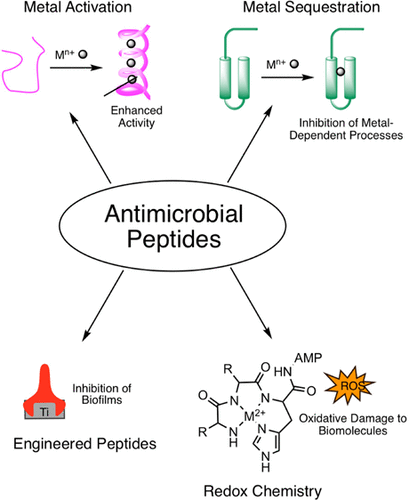当前位置:
X-MOL 学术
›
ACS Chem. Biol.
›
论文详情
Our official English website, www.x-mol.net, welcomes your feedback! (Note: you will need to create a separate account there.)
Antimicrobial Metallopeptides
ACS Chemical Biology ( IF 4 ) Pub Date : 2018-02-01 00:00:00 , DOI: 10.1021/acschembio.7b00989 Jessica L. Alexander 1 , Zechariah Thompson 1 , J. A. Cowan 1
ACS Chemical Biology ( IF 4 ) Pub Date : 2018-02-01 00:00:00 , DOI: 10.1021/acschembio.7b00989 Jessica L. Alexander 1 , Zechariah Thompson 1 , J. A. Cowan 1
Affiliation

|
Antimicrobial peptides are short amphipathic peptides that are produced by the innate immune system in order to protect a host from pathogens. They have been shown to have broad-spectrum antimicrobial activity toward Gram-positive and Gram-negative bacteria, as well as antifungal, antiprotozoan, and antiviral activity. These peptides are able to exert their activity through a variety of mechanisms that include inhibiting DNA and RNA replication, inhibiting protein synthesis, permeabilizing the cell membrane, disrupting proton and ion transmembrane gradients, and inhibiting cell wall biosynthesis. Certain antimicrobial peptides are able to utilize metals to modulate their activity through structural changes upon metal binding, metal sequestration, and redox chemistry. This work aims to provide a review of the current literature regarding the influence of metals on the activity of antimicrobial metallopeptides and their uses in drug delivery and the treatment of implant-associated infections.
中文翻译:

抗菌金属肽
抗菌肽是由先天免疫系统产生的短两亲肽,目的是保护宿主免受病原体侵害。它们已显示出对革兰氏阳性和革兰氏阴性细菌具有广谱抗菌活性,以及抗真菌,抗原生动物和抗病毒活性。这些肽能够通过多种机制发挥其活性,这些机制包括抑制DNA和RNA复制,抑制蛋白质合成,透化细胞膜,破坏质子和离子跨膜梯度以及抑制细胞壁生物合成。某些抗微生物肽能够利用金属通过金属结合,金属螯合和氧化还原化学反应中的结构变化来调节其活性。
更新日期:2018-02-01
中文翻译:

抗菌金属肽
抗菌肽是由先天免疫系统产生的短两亲肽,目的是保护宿主免受病原体侵害。它们已显示出对革兰氏阳性和革兰氏阴性细菌具有广谱抗菌活性,以及抗真菌,抗原生动物和抗病毒活性。这些肽能够通过多种机制发挥其活性,这些机制包括抑制DNA和RNA复制,抑制蛋白质合成,透化细胞膜,破坏质子和离子跨膜梯度以及抑制细胞壁生物合成。某些抗微生物肽能够利用金属通过金属结合,金属螯合和氧化还原化学反应中的结构变化来调节其活性。


























 京公网安备 11010802027423号
京公网安备 11010802027423号